Schole. Философское антиковедение и классическая традиция @classics-nsu-schole
Статьи журнала - Schole. Философское антиковедение и классическая традиция
Все статьи: 755
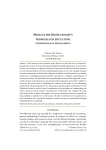
Proclus the neoplatonist's proposals on education: epistemological prolegomena
Статья научная
This historical and systematic study discusses in the form of a reconstructive proposal the system of the general epistemological principles followed by the eclecticist Proclus, who attempts to organize and present questions on Education directly associated with Practical Reason. From the methodological point of view, the example emerged from his commentary on the Platonic dialogues Alcibiades I and Respublica for providing instruction is multidimensional and holistic and aims at a complete transformation of human personality. The foundation for any philosophical and political approach, as constantly stressed, is that human is a special and unique being that can be able to influence decisively the social status. Considering the content of the study, we are discussing, mainly from a historical point of view, the position and the purpose of Education in Late Hellenistic Period, as well as Proclus’ contribution to the disciplines of Anthropology and Ethics, which are closely related to the objectives of Education. We complete the study with some further remarks with regard to the deepest meaning of Proclus’ proposal and the possibility to implement it in these days. The above-mentioned are not presented as final conclusions, but as questions-inquiries, in order to propose an internally developing methodology for investigating.
Бесплатно
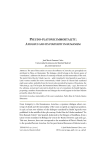
Pseudo-platonic immortality: axiochus and its posterity in humanism
Статья научная
The aim of this article is to trace the influence of Axiochus, an apocryphal text attributed to Plato, on Humanism. The dialogue, which belongs to the literary genre of “consolation”, addresses the theme of contempt of death and the immortality of the soul. The jurist Pedro Díaz de Toledo (1410/15 - 1466) translated it into Spanish in 1444 from a Latin version entitled De morte contemnenda, which Cencio de’ Rustici had translated eight years earlier, probably from the Greek codex provided by Joannes Chrysoloras, the Vaticanus gr. 1031. For his part, the humanist Beatus Rhenanus (1485 - 1547), the owner of five editions, revised and corrected in detail the text of a translation by Rudolf Agricola, proposing a number of amendments and changes that would appear in the Basel edition printed by Adam Petri in 1518.
Бесплатно
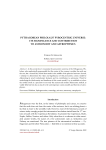
Pythagorean Philolaus pyrocentric universe
Статья научная
In this paper, firstly, the cosmology of the Pythagorean Philolaus is overestimated, insisting that the center of the universe is not the earth and not the sun, but the central fire center, which is located in the center of the spherical cosmos. Secondly, the author demonstrates the value and significance of this model of the firecentric cosmos, revealing its new and revolutionary elements and their contribution to the development of astronomy. Thirdly, emphasizing the universal significance and lasting value of this model, the author shows that it should be considered not only the precursor of the heliocentric model of the cosmos, as is usually done, but also the anticipation of modern cosmological and astrophysical constructions.
Бесплатно
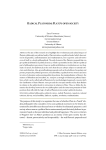
Radical Platonism: Plato's open society
Статья научная
The aim of this research is to highlight the revolutionary and radical impact of Platonic philosophy on political reality. Plato introduces a political model which does not end in dogmatism, authoritarianism and totalitarianism, but is aporetic and subversive even of itself, i.e., deeply philosophical. The only element of the Platonic proposal that can give political definitions is political science, which is personified in the collective political part of philosophers-governors. However, political definitions or institutions are not dogmatic in nature, but dialectical, in the sense that they are always subject to rational criticism and refutation. Also, groundbreaking proposals such as the abolition of nepotism and private property for political governors, social mobility, equality between women and men in terms of education and assuming political positions, the marginalization of slavery, the mixture of liberalism and socialism, etc. compose a strongly revolutionary political manifesto, which can be called radical Platonism.Our methodological approach concerns both the clarification of basic Platonic concepts and the concepts introduced by Alain Badiou in relation to the political and its reinvention in relation to Plato. Thus, we follow the dynamics that develop between the two philosophers and the meta-interpretation of their positions that will yield the logic of radical Platonism into today’s political situation.
Бесплатно
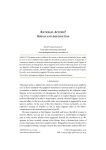
Rational actors? Hippias and Aristogeiton
Статья научная
This paper seeks to address the extent to which ancient historical actors might be seen to have exhibited what might be described as rational motives. In particular, it examines a number of strategic interactions employed by the Athenian tyrant Hippias in his interactions of Aristogeiton, the protagonist of an unsuccessful coup d’etat . A secondary objective of this paper is to explore Hippias’ reactionary policies following his brother’s assassination, namely, whether Hippias’ choice of external allies, in the face of possible exile, were irrational as suggested by some ancient authors.
Бесплатно
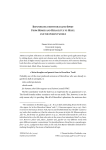
Reinforcing demythologized spirit. From Homer and Heraclitus to Hegel and the present world
Статья научная
Explicit reflections on intellectual faculties and their good applications begin by talking about a divine spirit and a human soul. Heraclitus seems to be the first to explain that all higher mental capacities rest on ethical formation. Self-conscious thinking leads therefore, as Hegel also sees, to normative sociality as its transcendental basis.
Бесплатно
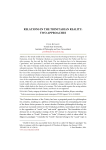
Relations in the Trinitarian reality: two approaches
Статья научная
The Greek model of the Trinity, based on the Theological Orations of Gregory of Nazianzus, treats the Trinitarian relations as connections between the Father and the two other persons: the Son and the Holy Spirit. The two relations have to be heteronymous (“generation” and “procession”), and have to be interpreted from the extreme realistic position. The Latin Trinitarian model, based on Boethius’ De Trinitate, treats relations as three subsistent persons. The relations have to be unidirectional: from the Father to the Son, and from both of them to the Holy Spirit. Both models are adequate and effective, but incompatible. One of the consequences of this incompatibility is the problem of filioque: the introduction of an additional relation of procession into the Greek model as well as the exclusion of this relation from the Latin model result in the inadequacy of the models. From the point of view of the complementability of a model, the Greek model allows introduction of new ele-ments, while the Latin model does not. The soteriological consequences are such that the Greek model welcomes a human person to establish a unique relation with the person of the Father, which leads to the theosis of a creature. The Latin model requires the saving relation to be established with the whole Trinity, and theosis is not supported.
Бесплатно
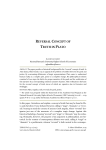
Reversal concept of truth in Plato
Статья научная
The paper provides a historical background for the “reversal” concept of truth. In Attic drama, Plato found a way to approach the problem of conflict between the good and justice. By overcoming deficiencies of tragic representations, Plato came to understand human reality as a complex plot, prone to a complete change. His philosophical solution consisted of two steps: the birth of a proper narrative of the good and the verification of this narrative by a corresponding common narrative of justice. This verification is the basis for the reversal concept of truth, traces of which are operative also in Descartes and Heidegger.
Бесплатно
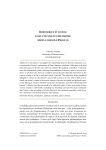
Rh'etorique et justice dans l’oeuvre du philosophe n'eoplatonicien Proclus
Статья научная
In this article, I investigate the relationship between rhetoric and justice as it is presented in Proclus’ commentary of Plato’s dialogue Alcibiades I. The study is divided into three parts. In the first one, which is entitled “The political counsellor”, I elaborate how this institutional person, utilizing the possibilities of rhetoric, aims to exercise prudence to all those who intent to complete personally and politically themselves in the context of justice. In the second part, which is entitled “The refutation of the superficial syllogisms”, I focus on what rhetoric can provide to man so as to be able to think in a rational way when it comes to the precise content of justice as a moral and political virtue. In the third part, which is entitled “The justice and injustice and their relationship with benefit”, I discuss how rhetoric needs to be utilized in order to have new modes of connection of justice with benefit, excluding any beneficial criterion. The main conclusion that I draw is that according to Proclus rhetoric is for a political counsellor a tool of justice, which has to be the final purpose of his mission.
Бесплатно
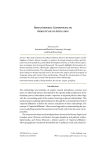
Roman Imperial Commonwealth: Iberian Case of Affiliation
Статья научная
This study examines the political relations between the Roman Empire and the Kingdom of Iberia (Eastern Georgia). It explores the Roman Empire's policies and attitudes toward its peripheries, particularly the Kingdom of Iberia, as well as Iberia's aspirations to integrate into the imperial framework. The research highlights the formation of a Roman imperial network, reflecting the alignment of interests and interactions between these two political entities. The relationship between the Roman Empire and Iberia is analysed using two Roman imperial sources: Res Gestae Divi Augusti and the inscription of Vespasian, along with Caesars Titus and Domitian. Through the interpretation of these materials, the study aims to model the dynamics of this relationship.
Бесплатно
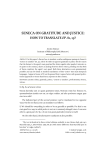
Seneca on gratitude and justice: how to translate Ep. 81, 19?
Статья научная
In this paper I discuss how to translate a rather ambiguous passage in Seneca’s “Letters to Lucilius” (81, 19), where he either I) opposes gratitude to justice for the reason that the former is the agent’s own good and the latter regards other people’s interests or, II) quite to the contrary, draws an analogy between these virtues, pointing out that both of them constitute the agent’s own good. Both these alternatives seem grammaticaly possible and can be found in modern translations of this “Letter” into main European languages. I argue in favour of II) on the ground that it agrees better with general perfectionist approach to virtues that Seneca espouses in this context.
Бесплатно
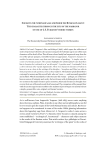
Статья научная
In Ivan S. Turgenev’s Khor and Kalinych (1846), which opens the collection of stories A Sportsman’s Sketches, the narrator compares the Athenian sage to one of the main characters of the sketch, Khor. This old man, whose family has long moved away from the rest of the private peasants, resembles Socrates in appearance. Turgenev’s character resembles Socrates in more ways than one: his manner of speaking – “a simple, wise discourse of a Russian peasant”. The narrator highlights his “philosophical” traits that liken him to Socrates: he is referred to as “an old sceptic”, “a positive man”, “a rationalist”; he is a clever old man who “speaks ingeniously”. These two characters (Socrates of Athens is known to us as a hero in the writings of his disciples – Xenophon and Plato) are akin in their propensity to ask questions, ironic as they might be. The narrator speaks about Khor’s contempt for women and his own old wife, who was “cross, ... and incessantly grumbled and scolded”. Which immediately evokes Socrates’ old woman – perhaps, one of the best-known women of Antiquity and, surely, the best-known wife of philosophers of all times. It is crossness that made Socrates’ spouse notorious. Khor and Socrates are brought close even in their care of themselves and their homestead. The comparison of the peasant Khor with the ancient sage Socrates testifies to the tradition of perceiving in our national culture a simple, peasant-like, wise, original, our Russian Socrates.
Бесплатно
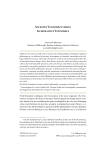
Socrates’ economics versus Ischomachus’ economics
Статья научная
The present study seeks to deepen the understanding of Xenophon’s political philosophy as it is reflected in Socrates’ investigation of economic knowledge in the dialogue titled Oeconomicus. The study concentrates on the six conventional parts of the oikos or household (house, things, slaves, land, horses, and wife), which are loosely connected with six facets of human life (pleasure, order, rule, leisure, enrichment, and education), as presented by the perfect gentleman (rich and successful) Ischomachus and his pupil, the (poor and wretched) philosopher Socrates. It demonstrates how the latter, learning Ischomachus’ economic teaching, radically transforms it, simultaneously showing the most serious possibilities lying behind the common notions of economic and political life and the inherent limitations of their fulfillment and threatening to undermine (and, indeed, undermining, in the personal case of Socrates) said ways of life as they are conventionally perceived.
Бесплатно
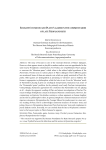
Socrates’ humour and Plato’s games in the commentaries of late Neoplatonists
Статья научная
The irony of Socrates is one of the essential elements of Plato’s dialogues. However, what appears ironic or playful to modern readers, was not apprehended in the same way by Neoplatonic commentators. For Proclus, one of problematic Plato’s passages concerns the “laborious game,” which refers to the refined eight hypotheses of the Parmenides. Proclus turns to various places of Plato’s dialogues where different games are mentioned. Some of them are mimetic arts, which are partly restricted in Plato’s Republic. Other games are distinguished as pertaining to “old men” and to children: the former is appropriate to philosophers, while the latter is not. Even the “laborious” mode of Parmenides’ playing is given an ontological interpretation. Damascius was aware of the “Parmenides’ game” problem, but he primarily used ready Proclean interpretation. Unsurprisingly, Damascius approaches the conclusion that Parmenides was not playing at all — despite the apparent wording of Plato and minute investigations of Proclus. The extant writings of Simplicius contain no dedicated Platonic commentaries. However, the commentary on Epictetus’ Enchiridion contains a verbose argument on human laughter and its role in a philosopher’s ethos. In general, Simplicius continues Damascius’ trend of rigorous seriousness. Olympiodorus the Younger follows his predecessors in a mere serious reading of Plato, but he acknowledges numerous instances of Socrates’ irony and joking. However, Olympiodorus dissociates Plato from Socrates’ irony and emphasises its purely didactic extent. Generally, we can conclude that the later a Neoplatonic commentator is, the less perceptive to Plato’s humour he appears.
Бесплатно
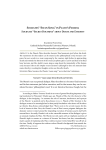
Socrates’ “swan song” in Plato’s Phaedo. Socrates' “secret doctrine” about death and eternity
Статья научная
In the Phaedo Plato describes Socrates’ final moments, just before his death. The statements he then makes can be treated as his philosophical creed. Socrates compares his own words to a swan song sung by the creature right before its approaching death and reminds his listeners of the swans’ prophetic gift. It can be said that in his final hour Socrates, just like Apollo’s swan, sings a song about the immortality of the human soul. Socrates refers to the Orphic “secret doctrine” (although he does not mention their name directly), revealing his thoughts on his own fate after death.
Бесплатно

Статья научная
The paper presents the philosophy of God in the philosophical writings of Apuleius of Madauros, one of the most outstanding philosophers of the Middle Platonism of the 2nd century after Chr. A special feature of the theology of the Middle Platonism and what clearly distinguished this philosophy from Stoicism, which was still dominant at that time, with its vision of divinity immanent in the world, was the return to the Platonic concept of the “incorporeal” and “transcendent” God – the Creator and Saviour of this world. This concept of God fit very closely into the mystical spirituality of Middle Platonism. The attribute of God as the Saviour (Sospitator) of the world is particularly important. This is especially visible in the writings of Apuleius. Apuleius uses the term “the Saviour” in the religious sense. This term expresses the religious aspect of God’s activity in relation to His creatures and supplements His metaphysical function as an efficient cause. Apuleius’ theology quite clearly shows its rootedness in the philosophy and mystical spirituality of Plato himself, and at the same time close to the mystical spirituality of the religious Mysteries popular then. It is a very important element of his philosophical spirituality. The awareness of the existence of God, the Creator, Father, and Saviour of the world, clearly influenced Apuleius’ ethics and his perception of man.
Бесплатно
Sources of fragments by the iconoclastic patriarch John Grammaticus (837-843): Leontius of Byzantium
Статья научная
This article analyzes two fragments by the last Iconoclastic Patriarch John Grammaticus (837-843). A number of parallels to the doctrine in the fragments have been identified, including Aristotle, Theodoret of Cyrrhus, Basil of Caesarea, and John Philoponus. It is proposed that the main source of the fragments was a passage from the Epilyseis or Solutions Proposed to the Arguments of Severus by Leontius of Byzantium.
Бесплатно
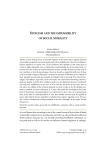
Stoicism and the impossibility of social morality
Статья научная
Stoic ethical theory is famously “rigorist” in the sense that it regards all kinds of generally recognized non-moral goods and evils as “indifferents” that do not influence human happiness or misery. One of the problems with rigorism is that prima facie it seems to make impossible even a rudimentary social morality, for if non-moral evils, experienced by the victims of various inhumane actions, actually do them no harm and do not contribute to their being unhappy, then why should we regard the infliction of these evils as morally wrong? In this paper I examine the question of whether such a critique of Stoic rigorism (put forward, for example, by Claudia Card in her book “The Atrocity Paradigm”) is justified. I argue that, on the one hand, one cannot find convincing counterarguments against it within Stoic tradition itself (e.g, the distinction between “preferred” and “rejected” indifferents, in my view, is of no avail for the Stoics in this case), but, on the other, the validity of this criticism depends on what we take to be the ultimate normative standard of moral evaluation. It is only valid under the assumption that some kind of “humanistic consequentialism” (as I call it here) is true. I also try to demonstrate that, if this kind of consequentialism is true, then similar criticism may be applied to many other ethical theories regardless of whether they endorse rigorism or not. (Personally, I believe “humanistic consequentialism” to be true, although I do not argue for this thesis here).
Бесплатно
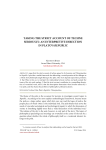
Taking the strict account of techne seriously: an interpretive direction in Plato’s "Republic"
Статья научная
I argue that the strict account of techne agreed to by Socrates and Thrasymachus in Republic I provides a useful framework for addressing a central question of the dialogue as a whole: how philosophy might belong to the polis. This view depends upon three positions: 1) that Plato invites us to interpret the relationship between techne and polis outside the terms of the city-soul analogy, 2) that the strict account contributes to a compelling description of vocational work, and 3) that this description determines what Socrates means by a true polis, and thus frames the problem of philosophy’s political inclusion.
Бесплатно
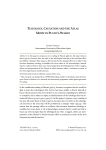
Teleology, causation and the atlas motif in Plato's Phaedo
Статья научная
In this paper, I propose a new reading of Phaedo 99b6-d2. My main thesis is that in 99c6-9, Socrates does not refer to the teleological aitia but to the aitia that will be provided by a stronger ‘Atlas’ (99c4-5). This means that the passage offers no evidence that Socrates abandons teleology or modifies his views about it. He acknowledges, instead, that he could not find or learn any aitia stronger than the teleological one. This, I suggest, allows an interpretation of the Phaedo in which Socrates offers a consistent account of the aitia of generation and destruction.
Бесплатно

